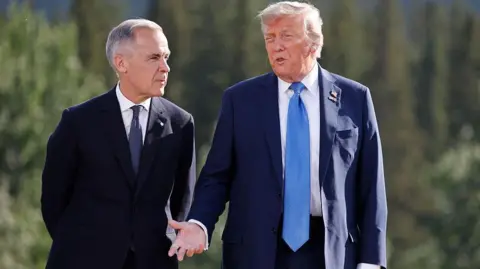Canada drops tech tax to restart US trade talks
 Getty Images
Getty ImagesCanada will rescind a tax on big US technology firms, just hours before first payments were due, to allow trade talks between the two countries to restart.
On Friday, US President Donald Trump called off negotiations over a trade deal, describing the tax as a "blatant attack", and threatened higher tariffs on imports from Canada.
In response, Canada has said it will introduce legislation to remove the tax and would halt the collection of payments, which were due on Monday.
White House economic adviser Kevin Hassett told Fox News on Monday that negotiations between the North American neighbours would "absolutely" restart as a result.
The digital services tax (DST) would have meant US tech giants including Amazon, Meta, Google and Apple faced a 3% charge on Canadian revenue above $20m.
Canada's finance minister, François-Philippe Champagne, issued a statement saying the tax would be rescinded.
"The DST was announced in 2020 to address the fact that many large technology companies operating in Canada may not otherwise pay tax on revenues generated from Canadians," it said.
"Canada's preference has always been a multilateral agreement related to digital services taxation," the statement added.
Many countries, including the UK, are changing how they tax large multinational technology firms, which have millions of customers and advertisers around the world, but high corporation tax bills due to the way their businesses are structured.
It was estimated that Canada's tax would cost the tech giants more than C$2bn ($1.5bn; £1.06bn) in its first year as the tax was being applied retroactively to January 2022.
Last year's federal budget estimated the tax would bring in C$5.9bn in total over the next five years.
Trump, who has forged a close relationship with tech company owners in his second term in office, has pushed back against such taxes.
He described Canada's policy as "egregious" adding "economically we have such power over Canada".
In a social media post on Monday, US Commerce Secretary Howard Lutnick thanked Canada for removing the tax, saying it would have "been a deal breaker for any trade deal with America".
Three quarters of Canada's goods exports go to the US, worth more than $400bn a year, while Canada takes just 17% of US production.
In a statement, the American Chamber of Commerce hailed the move to rescind the tax.
"This is a constructive decision that allows both countries to focus on strengthening their economic partnership," said chamber president Rick Tachuk.
Canada's climbdown comes after a rollercoaster few months for US-Canada relations.
Shortly after taking office Trump threatened to impose sweeping new tariffs and even to annex the US's northern neighbour.
The antagonism helped propel Canada's Liberal Party, led by former central banker, Mark Carney, back into power.
Since then there appeared to be a rapprochement, with Canada and the US saying they aimed to agree new trade terms by 21 July.
Canada's digital services tax has been a long-time irritant for the US dating back to the previous Biden administration.
Ottawa had received repeated warnings that it could undermine the trading relationship and lead to retaliation.
But earlier this month, Champagne said Canada would move ahead with collecting the scheduled payments from big tech companies regardless of ongoing talks with the US.
"It is hard to overstate how badly the government managed the DST issue over the past five years," Michael Geist, a law professor at the University of Ottawa who has written extensively on the policy, wrote on his blog on Monday.
He pointed to, among other factors, making the tax retroactive and downplaying bipartisan concerns from US lawmakers.
There has been Canadian opposition to the tax as well, with business groups warning costs will be passed along to consumers.
